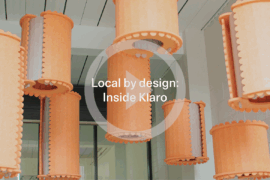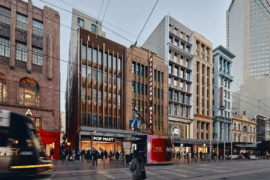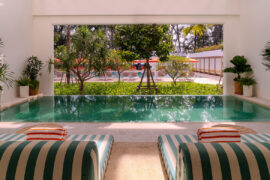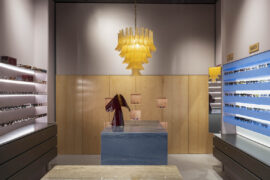From Thailand to Japan, the winning works highlight the importance of sustainability, biophilia and regenerative design.

The 2023 Golden Pin Design Award received a total of 2,324 entries from 15 countries such as Singapore, Malaysia, Taiwan, Hong Kong, Thailand, Lithuania, UK and India. Of these entries, 25 were named Best Design winners on 1 December during the award ceremony held at the Globe Playhouse, Taipei Performing Arts Centre.
Themed ‘Superload’, which explored designers’ desire to break free from conventional constraints despite life challenges, the award ceremony was more impressive than the last. The central stage features an arc arrangement of six movable rectangular displays that presented dynamic visuals for a concert-like effect. Famous Taiwanese actors, singers and music producers performed on stage throughout the evening. But the stars of the show were the award winners.

There are four different categories for the 2023 Golden Pin Design Award: Product Design, Communication Design, Integration Design, and Spatial Design. Competition was fierce in the Spatial Design category and five took top honours. Here are the category’s Best Design winners.
The tourist experience is heightend at a branch of the renowned Bangkok coffee brand, Bangna, which simplifies the building’s personality and expression. By incorporating numerous plantings and spatial transparency, it actively blurs the boundaries amongst the architecture, interior and landscape. This approach creates a tranquil atmosphere, providing an escape from the hustle and bustle of urban life and allowing tourists to focus on enjoying their coffee.


Undulating walls and subtle slopes, extending seamlessly from the landscape, embrace the recycling area. Various plants along well-defined routes create intriguing pathways. Clear and intuitive functional designs and mechanisms ensure a quick grasp of the recycling process. This campus center, once a closed-off and disorderly corner, has transformed into a vital public space, actively engaging with campus life as an educational site.


The designers created a fully inclusive children’s playground in Yamagata City, Japan. This open recreational space operates like a park, offering a welcoming environment for all children to play happily, irrespective of nationality, home environment, or disability. Wide slopes connect various internal functional spaces, enabling even children who don’t use wheelchairs to run freely.


Historically, the adaptive reuse of historical sites primarily focused on preserving their historical value. However, this project took a proactive approach by delving into the historical context and proposing a vision of collaborative urban regeneration. The complex, interconnected through three mutually interdependent axes of history, life, and city, links to shops, restaurants, community centers, and exhibition spaces. This arrangement enables residents to enjoy life, relax, and wander within the space.


To revitalise the local fishing industry in the Thai village of Ang Sila, the community constructed eco-tourism infrastructure. They transformed the traditional bamboo scaffolding used for oyster cultivation into a two-story overwater space. The ground floor serves as an oyster farm, while the upper floor provides tourists with the opportunity to experience seafood. This initiative integrates nature, culture, and tourism, breathing new vitality and development opportunities into old fishing villages. Read more about the project here.


Winning works on exhibit at Taiwan Design Museum
Should you be visiting Taipei, don’t forget to check out the all the winning entries from this year’s Golden Pin Design Award at the Taiwan Design Museum in the Taipei Songshan Cultural and Creative Park. They are showcased in an exhibition called Multidimensional Hyperplasia until 17 March 2024.

INDESIGN is on instagram
Follow @indesignlive
A searchable and comprehensive guide for specifying leading products and their suppliers
Keep up to date with the latest and greatest from our industry BFF's!

In an industry where design intent is often diluted by value management and procurement pressures, Klaro Industrial Design positions manufacturing as a creative ally – allowing commercial interior designers to deliver unique pieces aligned to the project’s original vision.

Merging two hotel identities in one landmark development, Hotel Indigo and Holiday Inn Little Collins capture the spirit of Melbourne through Buchan’s narrative-driven design – elevated by GROHE’s signature craftsmanship.

Lamitak’s Portfolio 2026/27 Collection made its debut in Bangkok with colour, energy and a crowd that celebrated design in full swing.

Opening in October 2025, The Standard, Pattaya Na Jomtien brings together ONION, DIN Studio, Studio Lupine and Verena Haller to create a sculptural modernist retreat where art, architecture and coastal culture meet.
The internet never sleeps! Here's the stuff you might have missed

With 26 shortlisted homes, a 13-member jury and four standout winners, the 2025 Habitus House of the Year program wrapped up last night in Sydney with Winnings.

A calm, gallery-like boutique by Brahman Perera for One Point Seven Four brings contemporary luxury and craft to Strand Arcade.